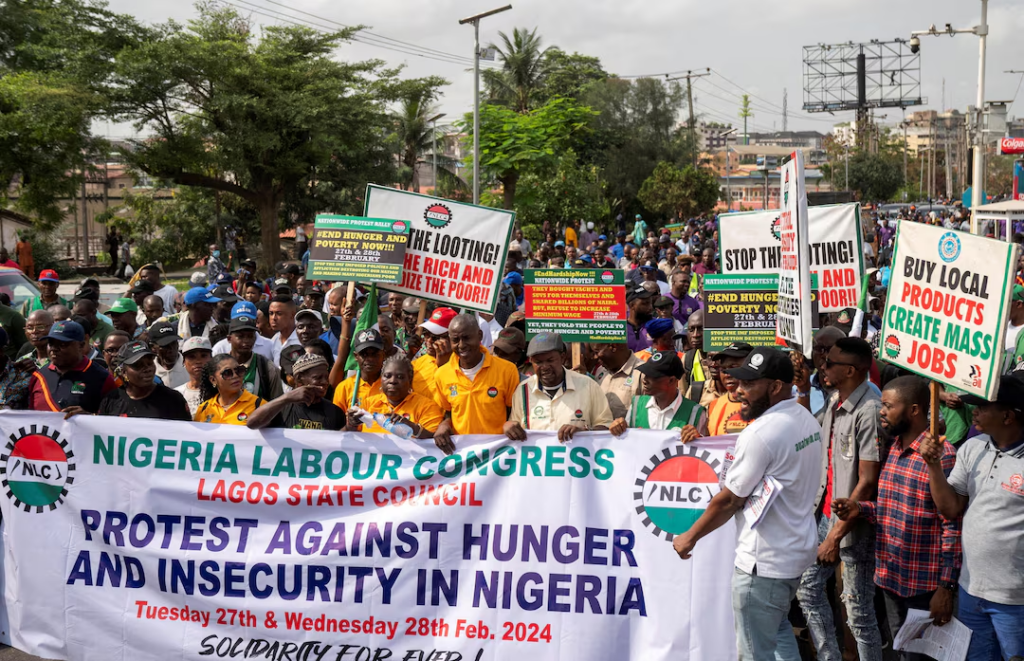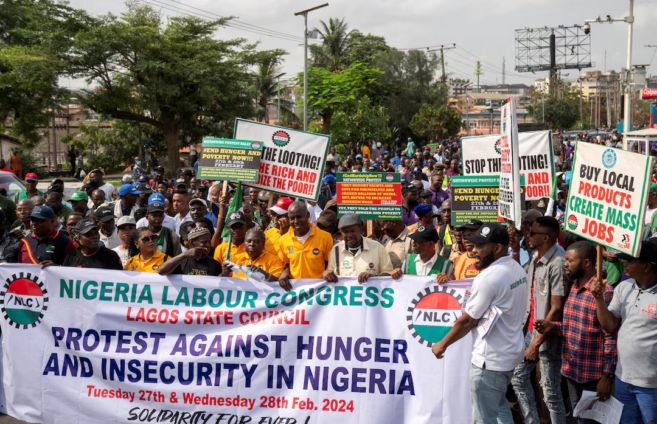Nigerian security forces deployed in major cities and the government said it was open to dialogue ahead of planned protests on Thursday against a cost of living crisis and poor governance that authorities fear could turn violent.
After taking office more than a year ago, President Bola Tinubu swiftly removed some fuel subsidies, devalued the naira currency and later hiked electricity tariffs, moves that have sent inflation soaring past 34%, eroding incomes.
Nigerians are also grappling with widespread insecurity, which has damaged the farming sector, while armed gangs kidnap residents and school children for ransom in the north.
Inspired by Kenyan protests, Nigerians are mobilising online to demand the reinstatement of petrol and electricity subsidies, free primary and secondary education and an end to insecurity, among other demands.
A senior government official, George Akume, said the protests could be infiltrated and become violent, without elaborating.
"We prefer dialogue, we are ready for dialogue," he told reporters, without saying whether the government had been in contact with the protest organisers.

"Nigeria is a work in progress and things will soon improve."
Tinubu's government has so far used a mix of threats and cajoling to discourage the protests.
In the capital Abuja, the commercial hub Lagos and the northern city of Kano, armed police deployed on major roads, set up security check points and searched cars.
Police occupied the main square in Abuja that protesters planned to use, while military vehicles parked nearby.
A court order confined Lagos protesters to two venues on the outskirts of the city.
Some Lagos residents said they were worried that protests could turn violent as happened during anti-police demonstrations, known as EndSars, in October 2020, when lives were lost and properties destroyed.
At one of Kano's largest malls, Sufi Mart, workers were busy reinforcing windows with shutters.
"I don't want it (the protest) to extend into the night so that it doesn't turn out to be another thing like EndSars," said Nneka Ochiachebe, who sells second-hand clothes at a Lagos market.
Latest Stories
-
Netflix debuts Grain Media’s explosive film
2 mins -
‘Expired’ rice scandal: FDA is complicit; top officials must be fired – Ablakwa
36 mins -
#TheManifestoDebate: We’ll provide potable water, expand water distribution network – NDC
54 mins -
IPR Ghana@50: Pupils educated to keep the environment clean
1 hour -
PenTrust CEO named ‘Best Pensions CEO’, company wins ‘Scheme Administrator Award’ at Ghana Accountancy & Finance Awards 2024
1 hour -
Alan Kyerematen’s ‘Brighter Future for Health Professionals’ in Ghana Revealed in Bono
2 hours -
#TheManifestoDebate: NPP will ensure a safer, cleaner and greener environment – Dr Kokofu
2 hours -
2024 Election: Police to deal with individuals who will cause trouble – IGP
2 hours -
Seychelles President’s visit rekindles historical and diplomatic ties with Ghana
2 hours -
Election 2024: EC destroys defective ballot papers for Ahafo and Volta regions
2 hours -
2024 Election: I am sad EC disqualified me, but I endorse CPP’s candidate – PNP’s Nabla
2 hours -
I want to build a modern, inclusive country anchored by systems and data – Bawumia to CSOs
2 hours -
Miss Health Ghana 2024: Kujori Esther Cachana crowned new Health Ambassador
3 hours -
Playback: The manifesto debate on WASH and climate change
3 hours -
Alan Kyerematen saddened by NDC and NPP’s neglect of Krofrom Market in the Ashanti Region
3 hours

